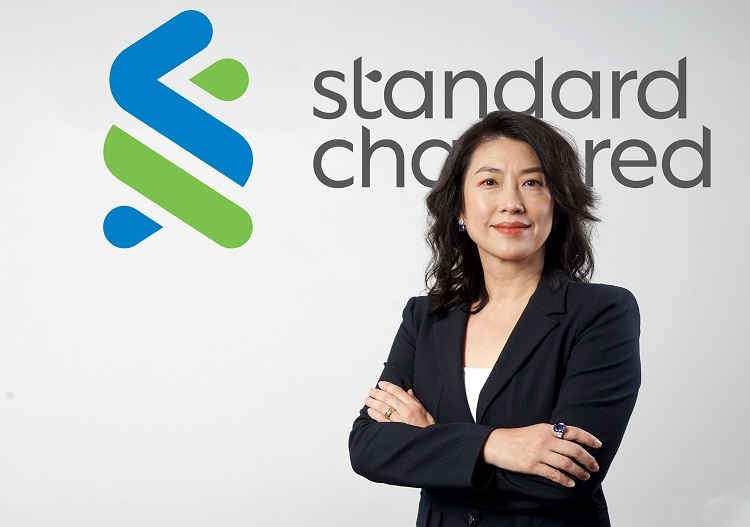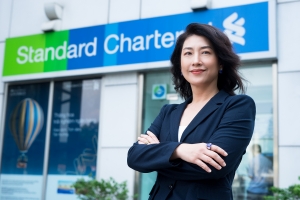Towards growing sustainably in a post-pandemic world
 |
| Michele Wee, CEO of British-backed lender Standard Chartered Vietnam |
The pandemic has caused unprecedented disruption to businesses and lives. How has Standard Chartered Vietnam been doing?
Our business remains resilient in a resilient economy. If you recall, Vietnam was one of the few economies that had positive GDP growth in 2020. At 2.9 per cent, this was one of the best performers in the world and the top in ASEAN. During the COVID-19 pandemic, borders closed early, the economy remained open. As a bank, when there is economic activity, there is work to do. We are pleased with our performance over COVID-19 and this year at current run rate.
What has been really great for us, and I am sure for many, is the acceleration of digitisation at our clients which has also helped us become even more efficient and productive in the way that we serve our clients’ banking needs. There have also been multiple opportunities to participate in corporate social responsibility (CSR) activities.
What do you think businesses should do to prepare for a post pandemic world?
The world as we know it has changed. We need to embrace the lessons learnt from this pandemic. Off the top of my mind, these are the following matters:
Health and safety policies need to include requirements on vaccination. Awareness for mental wellness has escalated during COVID-19 as people work more remotely. This needs to be embraced within organisations as an integral part of diversity and inclusion (D&I). An organisation that reinforces a strong D&I culture will help everyone feel they can bring their whole selves to work. I am an advocate for D&I and believe in setting targets, for example gender and ethnicity targets. Focus on employee wellness will help drive success and sustainable growth.
There needs to be flexibility within a defined structure. Remote work optionality allows for flexible schedules whilst setting the expectation for the organisation to achieve a balance. What this pandemic has shown us is that we do not need one physical location to effectively run, operate, or work, but we understand that having a gathering space for our teams does have value. Physical office will evolve from a necessity to value-add. The challenge for management now is to focus on strategies that utilise the physical gathering space to enrich and advance their teams and organisations that compliments sustainable growth.
Client service now needs to include solutions to meet client’s every changing need – providing assurance services, helping them to grow and transform, and scaling up on client connectivity through digitisation to be even more efficient and productive wherever they are. We should continuously review the entire value chain of customer life cycle – pre-, during, and post-service – to transcend disruptions.
Sustainable companies need to develop innovative solutions to meet the challenges sustainably and help their industries transform. There is also the need to make sustainable decisions that impact their staff, their customers, and the communities. Helping our markets and businesses reduce carbon emissions as fast as possible without slowing development should be in every management strategic direction.
In you view, what should future-fit leaders pay attention to?
Future-fit leaders need to evolve their skillset and set of values. Empathy, care, intuition, consistent, and clear communication are my baseline for managing hybrid teams. Employees will want leaders with a greater degree of flexibility who can pivot but also be firm on what they say “no” to. Leaders must evolve mindset to be coaches of their teams instead of maintaining hierarchical chains of command and be agile and resilient as they lead in this new unknown arena.
The multi-generational workforce expects to be led differently, and this generational divide gets larger and poses new challenges. I also expect that as the workforce evolves along with the growth of the gig economy, embracing and improving baseline understanding of technology and how to use the data for critical decision making is very important.
What would be the things that you think will not be the same as before the pandemic?
Some experts say that COVID-19 may become an endemic disease. I agree with this view. Thus, I think 100 per cent work from office structure will stay hybrid. Management should implement employment and work from office policies that are flexible and responsible, able to monitor people intelligently and continuously protect the health and safety of the organisation.
Business travel will likely be reduced as virtual meeting capability is now embedded in organisations. The effect of this will impact businesses supporting the aviation sector.
Eyes are firmly on global warming, accelerating zero and this generation of leaders are faced with a fixed timeline. Organisations should be working towards fulfilling their commitments to reduce carbon emissions if they have not started to do so immediately. We cannot afford to slide back to the old ways as this is not necessarily better.
E-commerce had a massive boon since 2020. Already it was on a growth trajectory, especially in Asia and in Vietnam as the top country to embrace ecommerce will continue post-COVID.
Organisations will likely continue to invest significantly in technology to support the work from home model in a safe and secure way. Information and cyber security is one of the biggest threats in the new world and will continue to get larger. We also see the continued growth of AI and harnessing data to facilitate better, purpose led decisions.
What would you as a leader of an organisation focus on?
Accelerating Zero: we aim to help emerging markets like Vietnam to reduce carbon emissions as fast as possible, without slowing development, putting the world on a sustainable path to net zero by 2050. We want to support and mobilise finance needed to provide people with clean energy, drive carbon-free transport, and facilitate the decarbonising of the manufacturing industry.
Lifting Participation: we look to improve the lives of people and their communities by unleashing the full potential of women and small businesses. We will accelerate the provision of quality financial services to women across our footprint, purposefully connect small- and medium-sized enterprises to international markets and build partnerships to expand the reach and scale of financial services.
Resetting Globalisation: we will support companies to improve working and environmental standards and giving everyone the chance to participate in the economy, so growth becomes fairer and more balanced. We will do so by: Increasing transparency in supply chains to enable consumer choice and drive responsible trade; Bringing new levels of security, tracking and confidence to financial activity; Providing access to the best and most innovative solutions to both private and public sectors.
 Standard Chartered Vietnam appoints Michele Wee as new CEO Standard Chartered Vietnam appoints Michele Wee as new CEO |
What the stars mean:
★ Poor ★ ★ Promising ★★★ Good ★★★★ Very good ★★★★★ Exceptional
Related Contents
Latest News
More News
- Private capital funds as cornerstone of IFC plans (February 20, 2026 | 14:38)
- Priorities for building credibility and momentum within Vietnamese IFCs (February 20, 2026 | 14:29)
- How Hong Kong can bridge critical financial centre gaps (February 20, 2026 | 14:22)
- All global experiences useful for Vietnam’s international financial hub (February 20, 2026 | 14:16)
- Raised ties reaffirm strategic trust (February 20, 2026 | 14:06)
- Sustained growth can translate into income gains (February 19, 2026 | 18:55)
- The vision to maintain a stable monetary policy (February 19, 2026 | 08:50)
- Banking sector faces data governance hurdles in AI transition (February 19, 2026 | 08:00)
- AI leading to shift in banking roles (February 18, 2026 | 19:54)
- Digital banking enters season of transformation (February 16, 2026 | 09:00)

 Tag:
Tag:



















 Mobile Version
Mobile Version